Mashed Potato Substitutes: 15 Healthy Alternatives
Traditional mashed potatoes may be the most popular potato variety. They’re versatile but during my health coaching sessions some clients have asked me about alternatives to them for various different reasons. Therefore, what are mashed potato substitutes?
The following are mashed potato substitutes:
- Mashed sweet potatoes
- Mashed cauliflower
- Mashed broccoli
- Mashed carrots
- Mashed butternut squash
- Mashed turnips
- Mashed parsnips
- Mashed rutabaga
- Mashed acorn squash
- Mashed brussels sprouts
- Mashed pumpkin
- Mashed yams
- Mashed taro
- Mashed ube
- Masked kabocha
What’s even better than these alternatives by themselves is they will add a huge dose of color, flavor and nutrition to your dinner plate.
In addition to coaching clients about them, I’ve purchased, researched and used the alternatives in recipes prior to, during and sometimes after writing this article.
Mashed Potato Substitutes
1. Mashed Sweet Potatoes
Sweet potatoes are an absolute favorite of mine. I (almost) never get tired of them. Now, sweet potato mash? That stuff is an absolute explosion of flavor and happiness. I use mashed sweet potatoes almost every time.
But how do they compare to your regular white mashed potatoes? Let’s take a look.
| Potato, raw (100 g) | Sweet Potato, raw (100 g) | |
| Calories | 69 | 86 |
| Protein | 1.68 g | 1.57 g |
| Carbohydrates | 15.7 g | 20.1 g |
| Fiber | 2.4 g | 3 g |
| Fat | 0.10 g | 0.05 g |
| Sugar | 1.15 g | 4.18 g |
Much of the nutrition information for these two foods is quite similar; however, one major difference is difficult to miss: the vitamin A content in sweet potatoes.
They have a little more than 14,000 IUs (international units) of vitamin A per 100 grams (3.53 oz) or about 284% of the suggested daily intake.
White potatoes, however, only have about 8 IUs per 100 grams or 0.1% of your suggested daily intake. So, if you’re looking for a good boost of vitamin A, then they are an excellent option in recipes. They’re also a good source of calcium.
It’s important to remember sweet potatoes are slightly higher in other areas, including:
- Calories
- Fiber
- Sugar
- Carbohydrates
The differences are minimal, though, and shouldn’t have a major impact unless you’re eating more than you can fit in your belly.
The video below discusses three mashed potatoes substitute.
2. Mashed Cauliflower
Mashed cauliflower is another favorite of mine. I find myself eating it more and more. Cauliflower mashed potatoes is perfect when you want something simple and easy. Just put a bit of salt and pepper on top, and you’re golden.
Let’s take a look at their nutrients.
| Potato, raw (100 g) | Cauliflower, raw (100 g) | |
| Calories | 69 | 25 |
| Protein | 1.68 g | 1.92 g |
| Carbohydrates | 15.7 g | 4.9 g |
| Fiber | 2.4 g | 2 g |
| Fat | 0.10 g | 0.28 g |
| Sugar | 1.15 g | 1.91 g |
Nutrient Resources3
Cauliflower has a bit more than a third less calories per 100 grams. Therefore, if you’re looking for a low-calorie choice, this is a really good option.
It’s also higher in:
- Choline
- Folate
- Vitamin C
- Vitamin K
It’s also significantly lower in carbs for those looking for a low-carb or ketogenic food for a recipe.
Overall, it doesn’t get much better than mashed cauliflower. Except, maybe, for sweet potato mash, but I suppose that’s a matter of personal preference.
To make the creamiest mash use a food processor or high quality blender. If you’re in need of a good blender, check out my Vitamix blender review here. Once you buy a Vitamix, you’ll never spend less on another blender again.
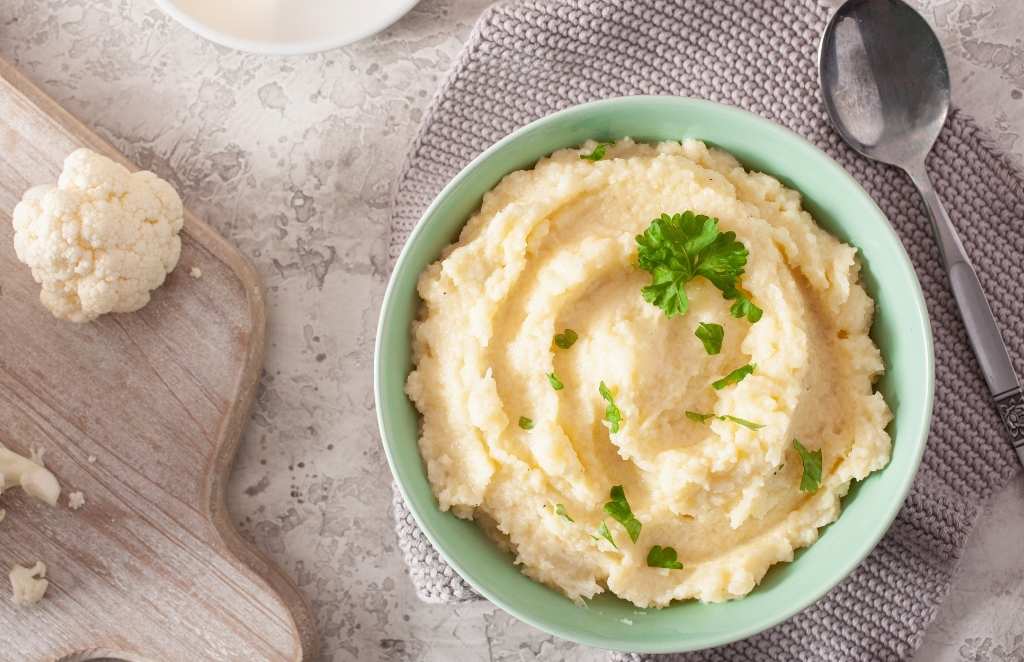
3. Mashed Broccoli
Some people have an issue with broccoli, and I know why. It’s because it’s oddly crunchy, bristly and doesn’t taste good to some. However, it’s similar to cauliflower in that a little bit of seasoning goes a long way.
Remember, you won’t need as much extra liquid with broccoli as with some other alternatives because it has relatively high water content.
Let’s take a look at their nutrients.
| Potato, raw (100 g) | Broccoli, raw (100 g) | |
| Calories | 69 | 32 |
| Protein | 1.68 g | 2.57 g |
| Carbohydrates | 15.7 g | 6.2 g |
| Fiber | 2.4 g | 2.4 g |
| Fat | 0.10 g | 0.34 g |
| Sugar | 1.15 g | 1.40 g |
Nutrient Resources4
Broccoli is another great option for recipes if you’re looking for a low-calorie side dish. For 100 grams of both, broccoli has less than half the calories. It also carries significantly more of the following:
- Folate
- Vitamin A
- Vitamin C
- Vitamin E
- Vitamin K
- Calcium
Broccoli also boasts a bit more protein, so that’s a plus. I can say mashed broccoli is more than good enough to add to a meal.
In addition and this has been proven by trial and error, kids like it more than raw broccoli. So, if you’re trying to get some nutrition in the kids and they hate eating broccoli, mash it, season it and you’re good to go.
Many of my health coaching clients are cooking it for their kids and finding great success. Like cauliflower, use a food processor or a high quality blender to make it creamy.
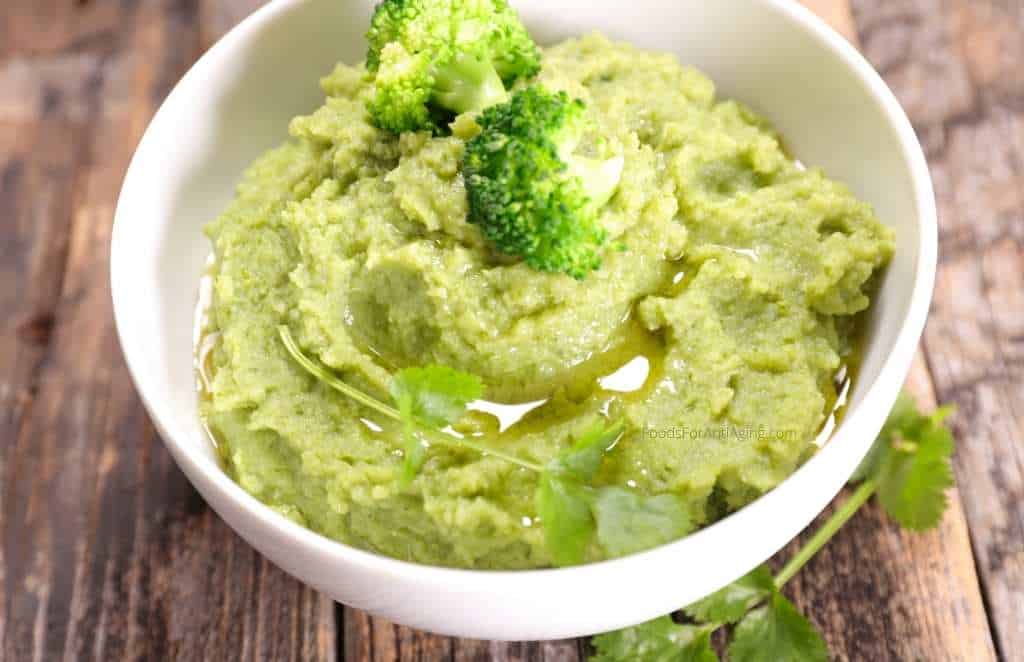
4. Mashed Carrots
Carrots, anyone? It doesn’t sound too good, does it? Believe it or not, they aren’t a bad replacement. Season it to your liking, and it’s a great way to mix up the dinner plate.
Let’s take a look at the nutrients.
| Potato, raw (100 g) | Carrots, raw (100 g) | |
| Calories | 69 | 45 |
| Protein | 1.68 g | 0.94 g |
| Carbohydrates | 15.7 g | 10.3 g |
| Fiber | 2.4 g | 0.9 g |
| Fat | 0.10 g | 3.1 g |
| Sugar | 1.15 g | 4.7 g |
Nutrient Resources5
Carrots’ claim to fame is its extremely high vitamin A content. Carrots have more vitamin A than sweet potatoes and way more than white potatoes.
One hundred grams of carrots have 334% of the daily recommended intake of vitamin A.
Why all this harping on vitamin A, you ask? It’s important to get vitamin A because, according to the National Institutes of Health, this vitamin helps with the following:
- Your vision
- Immune system
- Reproductive capabilities
It even assists organs like your heart, lungs and kidneys6.
Carrots have some other benefits too, like their low calorie and carb counts. Whichever way you look at it, carrots will be a great addition to a good, healthy recipe.
If you haven’t tried mashed carrots yet, what are you waiting for? The first time I made them mashed, I was pleasantly surprised.
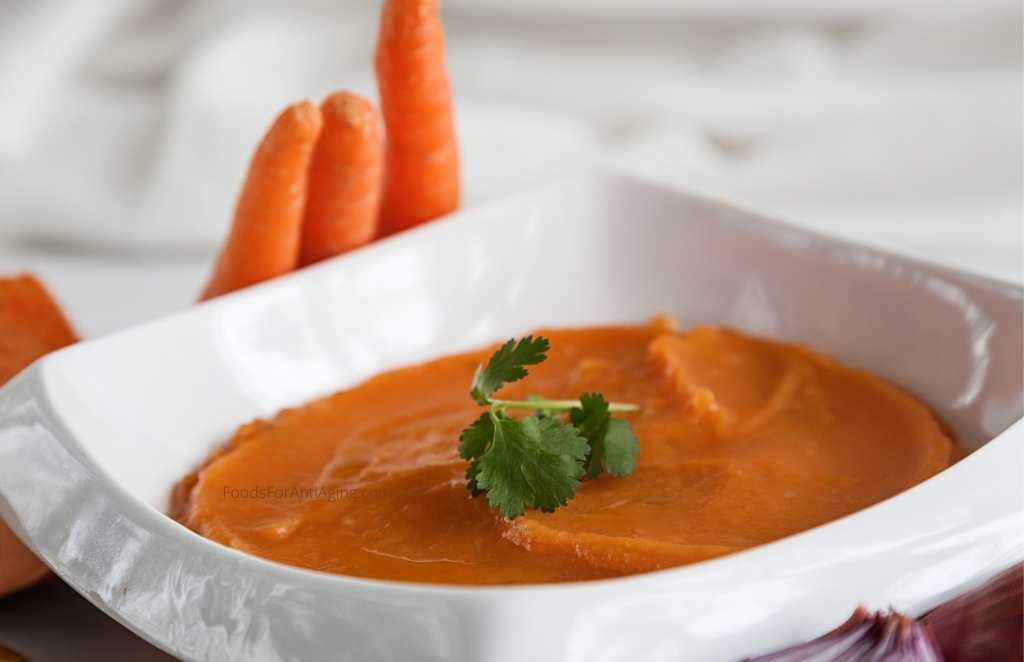
5. Mashed Butternut Squash
I think butternut squash is tasty, and it’s really nutritious. It has a similar sweetness to sweet potatoes, and also like them, it contains a high level of vitamin A.
Let’s take a look at the nutrients.
| Potato, raw (100 g) | Butternut squash, raw (100 g) | |
| Calories | 69 | 45 |
| Protein | 1.68 g | 1.00 g |
| Carbohydrates | 15.7 g | 11.7 g |
| Fiber | 2.4 g | 2.0 g |
| Fat | 0.10 g | 0.10 g |
| Sugar | 1.15 g | 2.20 g |
Nutrient Resources7
Butternut squash is lower in calories, carbs and full of good things the body needs to function properly, and for those reasons, it gets a high score. It contains more:
- Calcium
- Magnesium
- Vitamin C
- Vitamin A
- Folate
I suppose I should mention how good it tastes in a recipe with some seasonings on top.
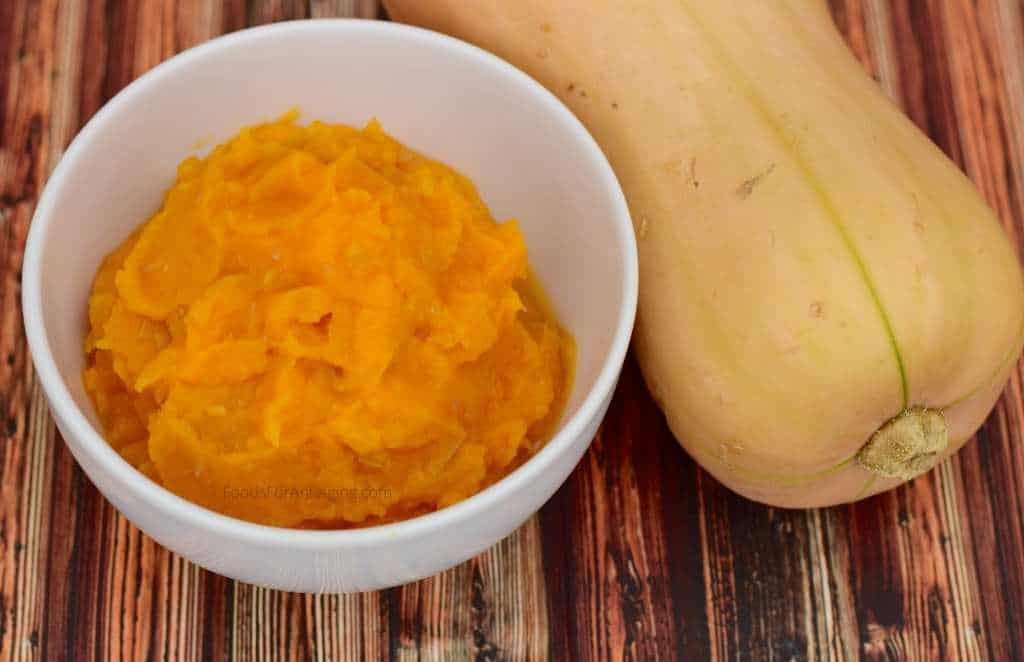
6. Mashed Turnips
Every Thanksgiving my Mom used to make mashed turnips in addition to potatoes. Turnips taste sweeter than the starchier alternative.
Turnips have the spiciness of radishes and the savory taste of cabbage. Some people find turnips tasting like a cross between carrots and potatoes. Therefore, they make a great addition to this list.
Let’s take a look at the nutrients.
| Potato, raw (100 g) | Turnips, raw (100 g) | |
| Calories | 69 | 28 |
| Protein | 1.68 g | 0.90 g |
| Carbohydrates | 15.7 g | 6.4 g |
| Fiber | 2.4 g | 1.8 g |
| Fat | 0.10 g | 0.10 g |
| Sugar | 1.15 g | 3.80 g |
Nutrient Resources8
Turnips are a great option if you’re looking for a low-calorie choice. For 100 grams, they have less than half the calories and carbohydrates. It also carries significantly more of the following:
- Calcium
- Vitamin C
Turnips will take slightly longer to cook so cut them smaller for boiling.
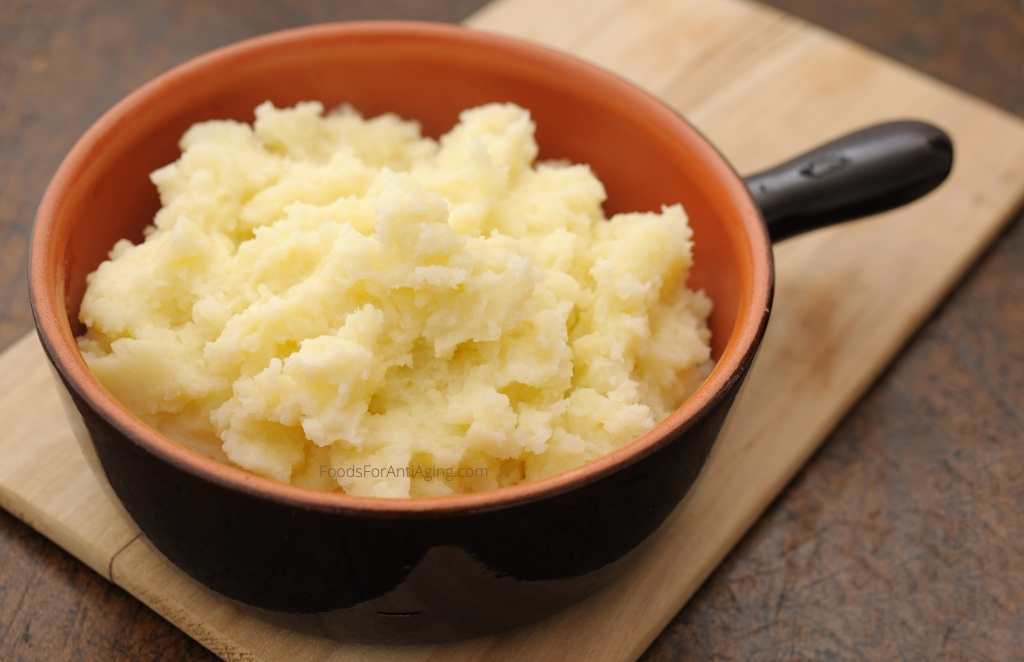
7. Mashed Parsnips
Like turnips, parsnips mashed are sweeter than potatoes. Their sweetness is closer to a carrot. They also have a cream colored flesh making them appear closer than some of the other foods on the list.
Parsnips are often roasted but they taste just as good when boiled and mashed. To make them creamier people often add milk. To add flavor try mixing in some apple, cinnamon or chili flakes.
Let’s take a look at the nutrients.
| Potato, raw (100 g) | Parsnips, raw (100 g) | |
| Calories | 69 | 75 |
| Protein | 1.68 g | 1.20 g |
| Carbohydrates | 15.7 g | 18.0 g |
| Fiber | 2.4 g | 4.9 g |
| Fat | 0.10 g | 0.30 g |
| Sugar | 1.15 g | 4.80 g |
Nutrient Resources9
Parsnips have a few more calories and carbohydrates but the difference is not huge. They do have approximately double the amount of fiber.
They also have more of the following:
- Calcium
- Vitamin C
- Folate
- Zinc
8. Mashed Rutabaga
Many people aren’t aware of what a rutabaga is. They are a root vegetable and like a cross between a turnip and a cabbage. They are often mistaken for turnips because they look similar.
In addition to roasting and frying, rutabagas make a great choice. They are much sweeter and less starchier. They mix well in recipes with onion, garlic, olive oil and black pepper.
Let’s take a look at the nutrients.
| Potato, raw (100 g) | Rutabaga, raw (100 g) | |
| Calories | 69 | 37 |
| Protein | 1.68 g | 1.08 g |
| Carbohydrates | 15.7 g | 8.62 g |
| Fiber | 2.4 g | 2.3 g |
| Fat | 0.10 g | 0.16 g |
| Sugar | 1.15 g | 4.46 g |
Nutrient Resources10
Rutabagas have considerable less calories and carbohydrates. They have slightly less protein and almost the same fiber.
Rutabagas have more of the following:
- Calcium
- Vitamin C
- Folate
Since I took over Thanksgiving from my Mother a few years ago, I’ve been making them mashed every year. It’s a nice compliment ( I still make mashed potatoes and sweet potatoes).
Rutabaga also made the list in this article. Check out the other 12 here, Low Carb Potato Substitutes: The 13 Best Alternatives.
9. Mashed Acorn Squash
Acorn squash is sweeter but less than sweet potatoes. The texture is similar, and the taste is slightly nutty.
Use less or no butter. Many recipes call for brown sugar which you can cut down or avoid to help keep things healthy.
Let’s take a look at the nutrients.
| Potato, raw (100 g) | Acorn squash, raw (100 g) | |
| Calories | 69 | 40 |
| Protein | 1.68 g | 0.80 g |
| Carbohydrates | 15.7 g | 10.4 g |
| Fiber | 2.4 g | 1.5 g |
| Fat | 0.10 g | 0.10 g |
| Sugar | 1.15 g | 2.46 g |
Nutrient Resources11
Acorn squash has less calories and carbohydrates. They have half the protein and less fiber.
Acorn squash has more of the following:
- Calcium
- Vitamin C
- Vitamin A
Are you using potato flakes? Find out the best alternatives in my article, Potato Flakes Substitutes: The 17 Best Alternatives.
The video below informs you how to make an acorn squash mashed recipe.
10. Mashed Brussels Sprouts
Just like broccoli and cauliflower, many people aren’t aware brussels sprouts can be mashed also. Many people do a smash version which is a nice option also.
Favorite additions include the following:
- Garlic
- Balsamic
- Black pepper
- Olive oil
- Crushed red pepper
- Lemon juice
Let’s take a look at the nutrients.
| Potato, raw (100 g) | Brussels sprouts, raw (100 g) | |
| Calories | 69 | 43 |
| Protein | 1.68 g | 3.38 g |
| Carbohydrates | 15.7 g | 8.95 g |
| Fiber | 2.4 g | 3.8 g |
| Fat | 0.10 g | 0.30 g |
| Sugar | 1.15 g | 2.20 g |
Nutrient Resources12
Mashed brussels sprouts are one of the few foods on the list which contain fewer calories and carbohydrates but more protein. In addition, it provides more fiber.
Brussels sprouts have more of the following:
- Calcium
- Vitamin C
- Vitamin A
- Iron
- Zinc
- Folate
For best results use a food processor.
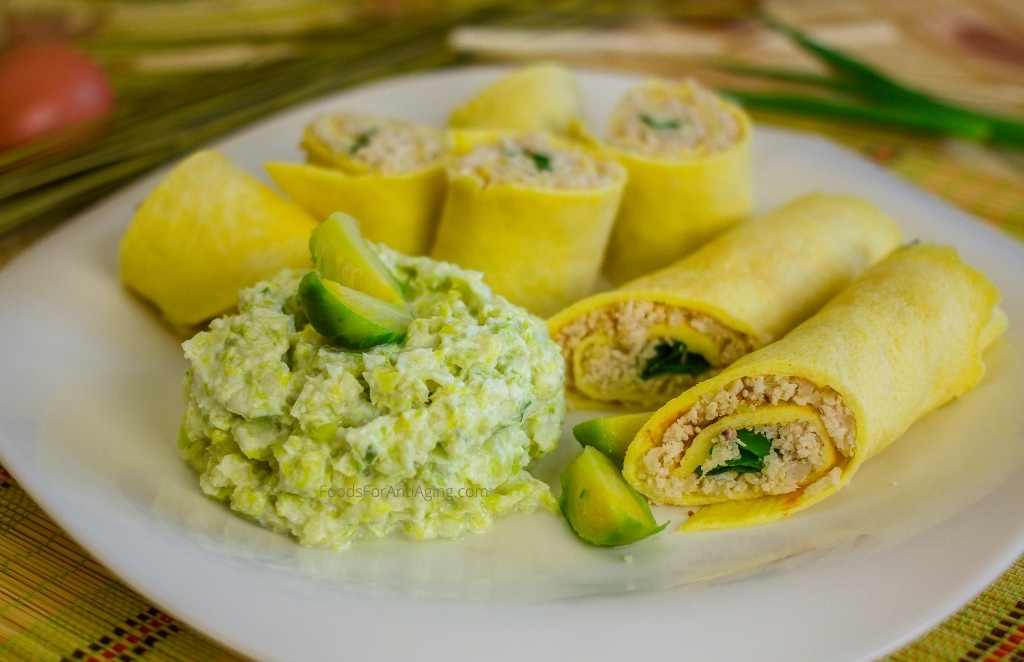
11. Mashed Pumpkin
Pumpkins are typically used for soups, pies or bread but taste great mashed also. Many people think it’s a vegetable but its actually a fruit.
Fun fact: The largest pumpkin ever grown weighed 1,140 pounds.
Mashed pumpkins will taste sweeter. They are more like sweet potatoes for taste and texture. For better results use small sugar pumpkins instead of the large ones.
When preparing be sure to remove all the skin because it has a bitter taste and unfavorable texture. Mashed pumpkin will be very creamy just like the real deal.
Favorite additions include the following:
- Garlic
- Black pepper
- Kosher salt
- Olive oil
Let’s take a look at the nutrients.
| Potato, raw (100 g) | Pumpkin, raw (100 g) | |
| Calories | 69 | 26 |
| Protein | 1.68 g | 1.00 g |
| Carbohydrates | 15.7 g | 6.5 g |
| Fiber | 2.4 g | 0.5 g |
| Fat | 0.10 g | 0.10 g |
| Sugar | 1.15 g | 2.76 g |
Nutrient Resources13
If you’re counting calories or carbs, pumpkin is a good choice for recipes because it contains about half the amount of each. Although it provides much less fiber and protein.
Pumpkins are 90% water but have more of the following:
- Calcium
- Vitamin A
- Iron
- Zinc
The video below informs you how to make mashed pumpkin.
12. Mashed Yams
Yams often get confused with sweet potatoes but are more like yuka. True yams have a bark-like skin with hairs. The skin is dark and the flesh is light colored.
The flesh is dry, starchy and stringy before mashing. They taste slight nutty like a sweet potato but less sweet.
Some producers label their sweet potatoes as yams. It was a tradition started over 100 years ago to distinguish sweet potatoes from regular potatoes. The USDA requires the label sweet potato to be accompanied by any labeling of sweet potatoes as yams.
Therefore, you’ll sometimes find the words yams and sweet potatoes on the same label.
True yams are difficult to find in your typical supermarket. You’ll have a better chance at a local grocery store specializing in products for foreign customers. They can also be found online.
In West Africa, people often mash yams and add them to soups.
Let’s take a look at the nutrients.
| Potato, raw (100 g) | Yams, raw (100 g) | |
| Calories | 69 | 118 |
| Protein | 1.68 g | 1.53 g |
| Carbohydrates | 15.7 g | 27.9 g |
| Fiber | 2.4 g | 4.1 g |
| Fat | 0.10 g | 0.17 g |
| Sugar | 1.15 g | 0.50 g |
Nutrient Resources14
If you’re counting calories or carbs, yams aren’t the best choice because it contains substantially more of each. Yams provide a similar amount of protein and more fiber.
Yams have more of the following:
- Calcium
- Vitamin C
- Vitamin A
- Folate
Some options are different for Yukon Gold potatoes. Find out how in my article, Yukon Gold Potatoes Substitute: The 13 Best Alternatives.
13. Mashed Taro
Taro is a starchy root vegetable with a rough, bark-like outer skin. The flesh is creamy white or purple.
Taro has a slightly sweet and nutty flavor. Taro has a pasty consistency. Some people call it a taro mash. In Hawaii, taro is used to make poi.
Favorite additions include the following:
- Salt
- Black pepper
- Garlic
- Plant-based butter
- Olive oil
Let’s take a look at the nutrients.
| Potato, raw (100 g) | Taro, raw (100 g) | |
| Calories | 69 | 112 |
| Protein | 1.68 g | 1.50 g |
| Carbohydrates | 15.7 g | 26.5 g |
| Fiber | 2.4 g | 4.1 g |
| Fat | 0.10 g | 0.20 g |
| Sugar | 1.15 g | 0.40 g |
Nutrient Resources15
If you’re counting calories or carbs, taro isn’t the best choice because it contains substantially more of each. Taro provides a similar amount of protein and more fiber.
Taro has more of the following:
- Calcium
- Vitamin A
- Folate
- Potassium
When I use taro, I easily find it in the produce section of my local supermarket. I took the picture below on my last trip.
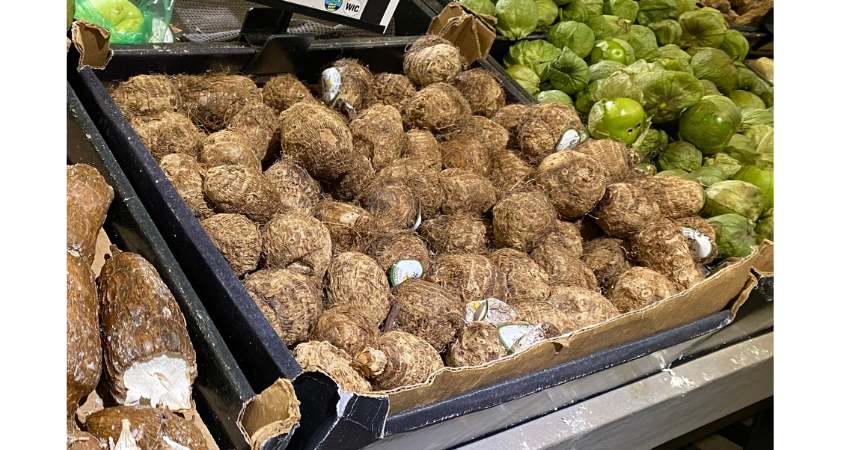
Find out the best russet potato alternatives in my article, Russet Potatoes Substitute: 13 Healthy Alternatives.
14. Mashed Ube
The flesh is creamy white, lavender or purple. The purple flesh gets darker when cooked.
In the Philippines, ube has been used to make deserts for years. They can be pureed, roasted, boiled and mashed.
Ube is earthy but is a little sweeter and nuttier. They often get confused with red yams or sweet potatoes. Many people call them purple yams.
Favorite additions include the following:
- Salt
- Coconut cream
- Plant-based butter
Let’s take a look at the nutrients.
| Potato, raw (100 g) | Ube, raw (100 g) | |
| Calories | 69 | 120 |
| Protein | 1.68 g | 1.00 g |
| Carbohydrates | 15.7 g | 27.0 g |
| Fiber | 2.4 g | 4.0 g |
| Fat | 0.10 g | 0 g |
| Sugar | 1.15 g | 0 g |
Nutrient Resources16
If you’re counting calories or carbs, ube contains more and may not be the better choice for you. Ube provides a little less protein and more fiber.
Ube has more of the following:
- Calcium
- Vitamin A
Many low carb options for sweet potatoes are different due to flavor. Check those out in my article, Keto Substitute for Sweet Potatoes: 8 Healthy Substitutes.
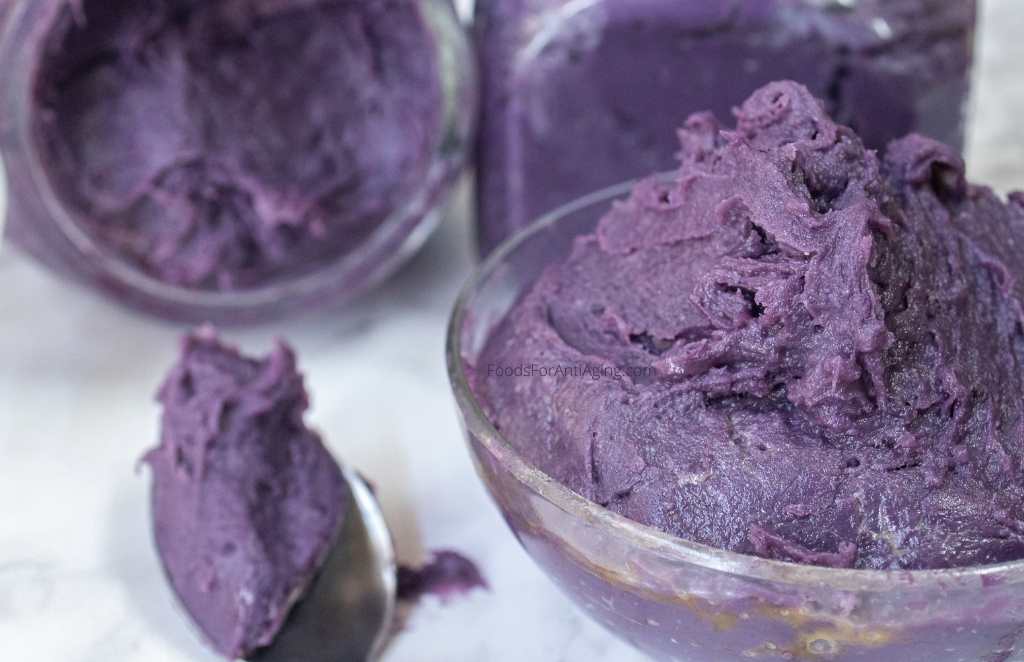
15. Mashed Kabocha
Kabocha is a hard squash and is also known as Japanese Pumpkin. It has a slightly bumpy skin with light green or white stripes.
The flesh is a dark yellow. It tastes like carrot and sweet potato mixed together. It’s slightly sweet but not as sweet as a sweet potato.
Favorite additions include the following:
- Salt
- Coconut oil
- Cinnamon
- Nondairy milk
- Honey
Let’s take a look at the nutrients.
| Potato, raw (100 g) | Kabocha, raw (100 g) | |
| Calories | 69 | 35 |
| Protein | 1.68 g | 1.18 g |
| Carbohydrates | 15.7 g | 8.2 g |
| Fiber | 2.4 g | 1.2 g |
| Fat | 0.10 g | 0 g |
| Sugar | 1.15 g | 0 g |
Nutrient Resources17
If you’re counting calories or carbs, kabocha contains less and is a good choice. Kabocha provides a little less protein and half the fiber.
Kabocha has more of the following:
- Calcium
- Vitamin C
Like mashed potatoes, kabocha is a good source of potassium and contains a few more milligrams than potatoes.
Mashed Potatoes Poll
To conduct some original research and get the opinions of real people, I polled my readers, clients and members of some food groups. I asked them what was the best mashed potato substitute?
- 27% said the best one was mashed sweet potatoes which was the winner of the poll.
If you have any questions about this mashed potatoes article don’t hesitate to email us. You can find an email on our contact page.
Read Next – More Food Alternative Articles!
8 Healthy Sweet Potato Flour Substitutes
Alternatives To Sweet Potatoes: 16 Unbeatable Substitutes
Is It Permissible To Substitute Fruit For Vegetables?
- USDA: Potatoes, white, flesh and skin, raw [↩]
- USDA: Sweet potato, raw, unprepared [↩]
- USDA: Cauliflower, raw [↩]
- USDA: Broccoli, raw [↩]
- USDA: Carrots, mature, raw [↩]
- National Institutes of Health: Vitamin A and Carotenoids [↩]
- USDA: Squash, winter, butternut, raw [↩]
- USDA: Turnips, raw [↩]
- USDA: Parsnips, raw [↩]
- USDA: Rutabagas, raw [↩]
- USDA: Squash, winter, acorn, raw [↩]
- USDA: Brussels sprouts, raw [↩]
- USDA: Pumpkin, raw [↩]
- USDA: Yam, raw [↩]
- USDA: Taro, raw [↩]
- USDA: Pamana, Whole Purple Yam, raw [↩]
- USDA: Kabocha Squash [↩]
